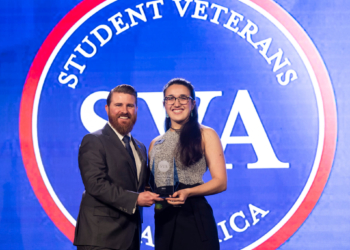If the thought of funding a college education — whether it’s your own or your child’s — keeps you up at night, you are not alone. Over the past 20 years, the cost of in-state tuition has gone up 212%, and the amount of student loan debt in the U.S. has reached a staggering $1.6 trillion.
But there are ways to tackle higher education costs. With a little bit of research and effort, you can save money and reduce the number of hours you or your children spend in the college classroom, because in this case, with the average college credit costing $559 — making most college courses cost around $1,677 — time is indeed money.
Here are some tips to help you save for a college education:
1. Take it slow, but make it automatic.
Saving the tens of thousands of dollars necessary for tuition can seem like an impossible task. But if you break it up into manageable monthly chunks, it makes it so much easier.
Fellow Military Saves staffer Jackie Toops decided that when her sons were born, she would try to save $1,000 a year for each of them so that by their 18th birthdays they could have at least $18,000 for college. She set up an automatic monthly allotment of $83.33 for each child at her bank, and she puts birthday money and other monetary gifts into the accounts, too.
The same kind of approach can be used to fund a tax-advantaged college savings account like a 529. Some states even have prepaid tuition plans with monthly payment options. Most of these allow you to lock in future college costs at current prices, which can be a considerable savings.
2. Get (free) credit where credit is due.
High schoolers may be able save on tuition by taking Advanced Placement (AP) exams and earning college credit. While this option generally requires taking an accompanying AP course, there is another affordable option out there: College-Level Examination Program (CLEP) tests.
The College Board offers 34 exams in subjects ranging from accounting to composition. These exams cost $89 each, but military members and a few categories of spouses and civilian employees may be able to take them for free.
Each college has different requirements for CLEP and AP credit acceptance, so it’s best to check beforehand.
3. Dual enrollment for high schoolers.
Many local community colleges allow high school students to take dual enrollment courses either through the high school or at the college itself. Some school systems will pay for these courses, essentially giving high school students an opportunity to earn college credits for free.
4. Apply yourself.
Apply for scholarships, that is. There are scholarships for just about every demographic out there. There are literally hundreds of millions of dollars available each year in the form of grants and private scholarships. Use free search engines like the College Board’s Scholarship Search or Fastweb to narrow down the possibilities.
And continue to apply each year, even when you have already received a grant (or been turned down) in the past.
Also make sure you fill out the U.S. Department of Education’s free FAFSA form every year. Many families skip this essential step and therefore miss out on potential grants, work-study, loans, and scholarships.
5. Get creative.
Military families are used to being flexible and adaptable. Apply that skillset to the college experience. It may make sense to split Post-9/11 GI Bill benefits between multiple children. Or between a spouse and a child. Or maybe you start your degree at community college with lower costs per credit hour and then transfer to a four-year institution later.
If you are an active-duty service member, see if you can use Tuition Assistance benefits. Some employers like UPS and Starbucks offer tuition reimbursement. Or get a job at a college or university — if you work full time for any of the 677 private universities that are part of the Tuition Exchange network, you, your spouse, and your dependents get tuition and fees covered at any of the participating universities.
College is expensive, but by automating savings and finding ways to cut costs and time, you can fund education while still saving for other important priorities.
Want inspiration and motivation to save for your goals? Take the Military Saves Pledge and then visit militarysaves.org or follow us on social media.






































